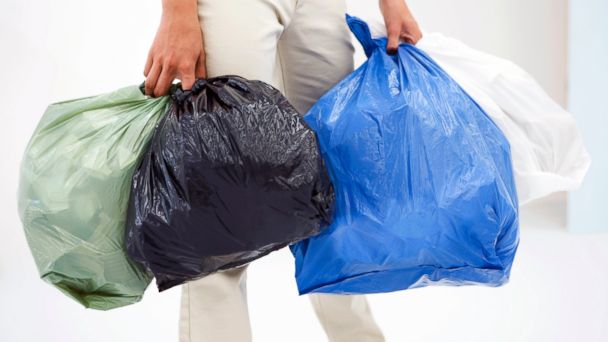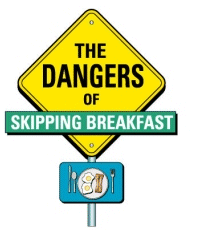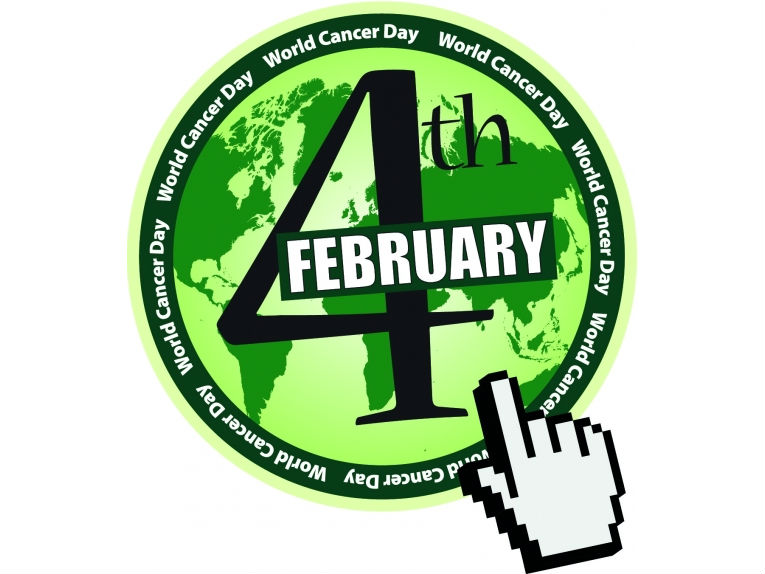When we talk about the steps you need to take to get healthier, they often involve buying new things: workout clothes, fitness equipment, ingredients for healthy recipes, and the list goes on. But becoming the healthiest version of yourself also means throwing away the stuff that’s holding you back—and we don’t only mean junk food. Get your recycling or garbage can ready!

Old plastic containers
Go through your collection of food-storage containers and toss anything made of clear, rigid plastic, and stamped with a 7 or “pc” (stands for polycarbonate). “These are the types of containers that may contain BPA,” says Sonya Lunder, MPH, a senior analyst at the Environmental Working Group, who also advises tossing warped or cracked containers. While manufacturers have take BPA out of many of the newer polycarbonate containers, old ones still probably have it. And multiple trips through the dishwasher can up leeching of the chemical. Lunder also cautions against heating any type of plastic in the microwave because of chemical-leeching concerns. “Glass is safer in general,” she says.
Air fresheners
Though some companies have recently announced they’re phasing out phthalates, which are used to help fragrance linger longer, many air fresheners (solids, sprays, and plug-ins) still contain this type of chemical, which in large doses may have harmful effects on reproduction or development. “These products are simply chemical perfumes that you put in the air,” says Lunder, who argues that it’s much healthier to take care of the root cause of a smell than mask it with chemicals.
Antibacterial soap
Antibacterial soap is no more effective at killing bacteria than the regular stuff—and they may not be safe, according to a 2014 FDA report. Triclosan, the active ingredient in antibacterial cleansers, has been shown to alter hormone regulation in animals, and there’s also concern that the chemical may contribute to antibiotic resistance.
When we talk about the steps you need to take to get healthier, they often involve buying new things: workout clothes, fitness equipment, ingredients for healthy recipes, and the list goes on. But becoming the healthiest version of yourself also means throwing away the stuff that’s holding you back—and we don’t only mean junk food. Get your recycling or garbage can ready!
When we talk about the steps you need to take to get healthier, they often involve buying new things: workout clothes, fitness equipment, ingredients for healthy recipes, and the list goes on. But becoming the healthiest version of yourself also means throwing away the stuff that’s holding you back—and we don’t only mean junk food. Get your recycling or garbage can ready!
Old plastic containers
Go through your collection of food-storage containers and toss anything made of clear, rigid plastic, and stamped with a 7 or “pc” (stands for polycarbonate). “These are the types of containers that may contain BPA,” says Sonya Lunder, MPH, a senior analyst at the Environmental Working Group, who also advises tossing warped or cracked containers. While manufacturers have take BPA out of many of the newer polycarbonate containers, old ones still probably have it. And multiple trips through the dishwasher can up leeching of the chemical. Lunder also cautions against heating any type of plastic in the microwave because of chemical-leeching concerns. “Glass is safer in general,” she says.
Air fresheners
Though some companies have recently announced they’re phasing out phthalates, which are used to help fragrance linger longer, many air fresheners (solids, sprays, and plug-ins) still contain this type of chemical, which in large doses may have harmful effects on reproduction or development. “These products are simply chemical perfumes that you put in the air,” says Lunder, who argues that it’s much healthier to take care of the root cause of a smell than mask it with chemicals.
Antibacterial soap
Antibacterial soap is no more effective at killing bacteria than the regular stuff—and they may not be safe, according to a 2014 FDA report. Triclosan, the active ingredient in antibacterial cleansers, has been shown to alter hormone regulation in animals, and there’s also concern that the chemical may contribute to antibiotic resistance.
Your stash of diet soda
If you haven’t already, you may want to reconsider your diet soda habit—especially if you’re trying to lose weight. A much-buzzed-about study published in the journal Nature found that non-caloric sweetenerssuch as saccharin (Sweet-n-Low), sucralose (Splenda), and aspartame (Equal) may mess with the gut bacteria that play a key role in healthy metabolism. Researchers found a link between these sweeteners, altered gut microbes, glucose intolerance and metabolic syndrome (both precursors to Type 2 diabetes) in mice and humans.
Worn-out running shoes
Most running shoes should be replaced every 300 to 400 miles, says Jason Karp, MD, exercise physiologist and author of Running for Women. For a runner who logs 30 miles a week, that’s about every three months. When shoes wear down, they lose their cushioning and are less capable of absorbing the impact of your foot landing with each step, so more force is transmitted to muscles, bones, and tendons, putting you at risk for injuries, he explains. If you’re not a runner, replace them about every six months, or as soon as you notice that the tread is looking worn out.
Frayed toothbrush
If you’re brushing in the morning and the evening like you’re supposed to, then your toothbrush bristles are probably becoming frayed and worn faster than you realize. “In my experience, bristles start to fray after about two months of use, so I recommend my patients replace their brushes every three months,” says American Dental Association spokesperson Ruchi Sahota, who is a practicing dentist in California. Worn-out brushes are less effective at cleaning teeth and fighting off decay.
Clutter
“In the end, we are what we think about, and what we think about is heavily influenced by what we keep around us,” says motivational speaker and life coach Gail Blanke, author of Throw Out Fifty Things. She calls the things that neither serve a specific purpose nor exist to make you feel good “life plaque”: “The more life plaque we pile around ourselves, the less we can focus on what we really care about,” she explains. Not sure where to start? Toss things that annoy you every time you see them, like socks that have lost their match, or your overflowing kitchen junk drawer. No matter what you decide to throw out (or donate), your goal is to whittle the physical objects down to only items that help you feel energized and accomplish your goals.
Clothes you don’t wear anymore
Take a peek in your closet. How many items have you not worn within the last year? Many people who’ve lost weight keep the bigger sizes around in case they regain it, while others hold onto the size 2 jeans they wore in high school, thinking maybe if they diet they’ll fit again. In either case, seeing these items every day can bring on anxiety. That’s not how anyone wants to feel when getting ready.
Leftovers lingering in the fridge
When it comes to highly perishable food that contains animal ingredients, the rule of thumb is to eat, toss, or freeze after three days, says Michael P. Doyle, PhD, director of the Center for Food Safety at the University of Georgia. “Listeria is linked to scary things like meningitis, miscarriages, and even death,” he says. “It can grow to millions at refrigerator temperatures in under a week.”
Old mascara
Liquid makeup, including mascara, can harbor a lot of germs, says Thomas Steinemann, MD, an American Academy of Ophthalmology spokesperson who practices in Ohio. That’s why he recommends throwing tubes away two to three months after opening. “Each time you use mascara, you are brushing it and any germs onto your lashes,” he says. “You’re also contaminating the brush with even more bacteria present on your skin or eyelashes, then plunging it into a moist room-temperature environment, which encourages bacterial growth.” One of the primary functions of eyelashes is to keep debris and germs from entering your eye, so it’s important to keep the makeup you put on them as germ-free as possible, he adds.
Dirty contact lens case
“Using a dirty lens case is one of the primary risk factors for getting eye infections,” says Dr. Steinemann, who recommends replacing you lens case at least every three months, as well as cleaning, air-drying facedown, and using fresh solution daily. “Even if you care for your lens case fastidiously, a grimy biofilm builds up on the surface that’s a magnet for dirt and germs,” he explains. “If you don’t change it out for a new one, you’re putting yourself at risk for a potentially serious eye infection like a corneal ulcer that can become infected and—even when healed—result in a scar that could affect your vision,” he adds. Don’t mess with your eyes, people!
Stale spices
Spices that have been hanging out in your cabinets for years probably won’t make you sick—but they won’t add any flavor to your food, which is key when you’re trying to cook healthy meals that don’t go overboard on fat or calories. Fresh spices can mean the difference between bland meals that makes you consider giving up on your goals and ordering delivery, and amazingly flavorful food that’s good for you and satisfying.
Old sunscreen
When it comes to sunscreen, the expiration date really does matter, says Beth Lange, PhD, chief scientist at the Personal Care Products Council. The chemicals that block the sun break down over time, so no matter how much you slather on, it’s not going to protect your skin from aging or cancer risk.
Old lip gloss
Anything that’s used around your mouth collects a lot of bacteria quickly, and the longer the bacteria sits in a moist tube, the more it grows. This increases your chance of infection if it gets into a cut or crack on the delicate skin of your lips. For this reason, experts recommend that you throw out lip gloss or other lip makeup no more than six months after you open it and begin using it, or by the expiration date, whichever is sooner.
Musty, clogged air filters
If you have an air purifier at home, you get a gold star. “HEPA filtered air cleaning devices—the most efficient kind—are important because according to the EPA, indoor air quality is 25 to 100 times worse than outdoors,” says Philip Tierno, PhD, a microbiologist with New York University. In fact, the average 1,500 square foot house can accumulate 40 pounds of dust (40,000 dust mites per ounce). “One in five Americans suffer from allergies or asthma, which can be exacerbated by dust, mold, and bacteria in the air so a good filter system goes a long way,” he adds. Just don’t forget to replace the filter every so often or you could actually be growing mold and bacteria, and blowing contaminants back into your air. How often depends on what kind you have, so check with your manufacturer and use common sense. One telltale sign it needs to be tossed is a musty smell.
Your kitchen sponge
Studies show the kitchen sponge is the germiest thing in the average American household, says Tierno. While some experts recommend microwaving sponges daily to zap bacteria, Doyle recommends skipping them completely: “When you use a sponge to clean meat juices, which can contain harmful microbes like salmonella, and it stays moist at room temperature, they grow quickly and studies show even the dishwasher doesn’t kill them.” He advises using a washcloth to clean dishes instead, grabbing a clean one every few days, and throwing the dirty ones in with your laundry. “Because it’s thinner, a washcloth dries quicker than a sponge between washes, which helps significantly slow bacterial growth,” he explains.
Plastic cutting boards
Slicing and dicing on plastic cutting boards scores the surface (those lines you begin seeing after the first few times you use one). Once bacteria get into these tiny grooves and begin to grow, they can be very difficult to get rid of, says Doyle. He recommends switching to wooden cutting boards because wood contains resins that are naturally antimicrobial. Translation: when you score a wooden cutting board and bacteria seeps in, it dies instead of thrives.
Smart devices
You don’t need to toss your iPhone or Android out completely (phew!), but you should definitely unplug from time to time. Mounting research indicates that information overload—what happens when you use smart devices constantly—is linked to depression and anxiety. Recent studies suggest that this is particularly true for people who are overly attached to their smartphones and tablets, and for those who use multiple devices at once (which experts call media multitasking). Power down and stow your devices in a drawer at least a few times per week to give your brain a break‚ ideally on a set schedule (for example, weekdays after 9 p.m. or weekend mornings before noon).
Your chair
Global studies show that the average person sits 7.7 hours a day, and some estimate people sit up to 15 hours a day, says Robert Emery, professor of occupational health at the University of Texas School of Public Health. Excessive sitting impacts the body’s metabolic system, and can lead to obesity, high blood pressure, diabetes, cancer, and depression. But it’s not as simple as putting in more time at the gym, which may not even reverse “sitting disease,” adds Emery. The American Medical Association recommends switching to a standing desk for work as an excellent way to combat the health issues associated with too much sitting
Source: Health.com




